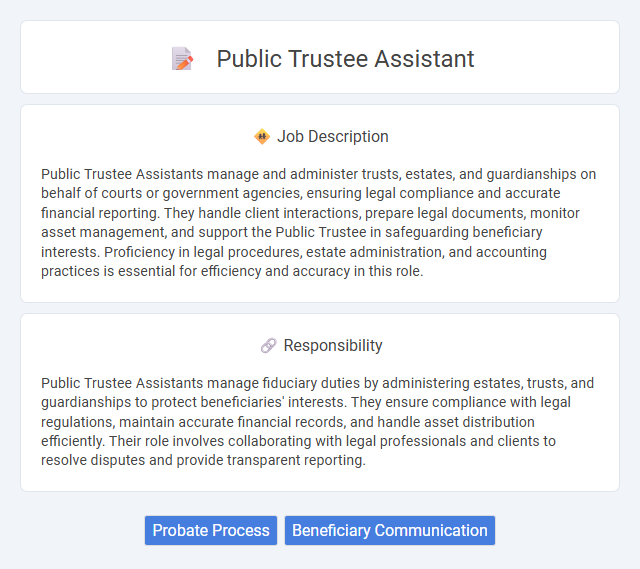
Public Trustee Assistants manage and administer trusts, estates, and guardianships on behalf of courts or government agencies, ensuring legal compliance and accurate financial reporting. They handle client interactions, prepare legal documents, monitor asset management, and support the Public Trustee in safeguarding beneficiary interests. Proficiency in legal procedures, estate administration, and accounting practices is essential for efficiency and accuracy in this role.
Individuals who are likely empathetic, detail-oriented, and capable of managing sensitive financial and legal matters may be suitable for the Public Trustee Assistant role. Those who struggle with high levels of responsibility or handling confidential information might find the job challenging. The position probably requires strong organizational skills and a steady temperament to support vulnerable clients effectively.
Qualification
A Public Trustee Assistant typically requires a bachelor's degree in law, public administration, or social sciences, combined with strong organizational and communication skills. Experience in legal research, case management, or client services enhances the candidate's ability to support estate administration and trust management effectively. Proficiency in relevant software and knowledge of local probate laws are essential for accurate documentation and compliance.
Responsibility
Public Trustee Assistants manage fiduciary duties by administering estates, trusts, and guardianships to protect beneficiaries' interests. They ensure compliance with legal regulations, maintain accurate financial records, and handle asset distribution efficiently. Their role involves collaborating with legal professionals and clients to resolve disputes and provide transparent reporting.
Benefit
The Public Trustee Assistant role likely offers significant benefits such as gaining valuable experience in estate management and legal documentation. It may provide opportunities for professional growth within public administration and enhance skills in client interaction and financial oversight. Job stability and potential for competitive compensation could also be expected in this position.
Challenge
Working as a Public Trustee Assistant likely involves navigating complex legal and financial documents, which can be both mentally demanding and detail-oriented. There is a high probability that the role requires balancing sensitive client information with strict regulatory compliance, presenting ongoing ethical and procedural challenges. Managing multiple cases simultaneously could strain organizational skills and increase the potential for error, highlighting the need for meticulous attention and resilience.
Career Advancement
Public Trustee Assistants play a crucial role in managing estates, trusts, and financial affairs, offering a solid foundation in legal and financial services. Career advancement opportunities often lead to senior trustee positions or specialized roles in estate management and legal advisory, driven by expertise in compliance and fiduciary responsibilities. Gaining certifications such as Certified Trust and Financial Advisor (CTFA) can significantly enhance prospects for leadership roles and increased remuneration.
Key Terms
Probate Process
A Public Trustee Assistant specializes in supporting the probate process by managing estate documentation, verifying the validity of wills, and coordinating with courts to ensure legal compliance. They assist in asset inventory, debt settlement, and distribution of estate property to rightful beneficiaries under the supervision of a Public Trustee. Expertise in probate law and estate administration is essential for efficient resolution of estate matters and protecting heirs' rights.
Beneficiary Communication
Public Trustee Assistants play a crucial role in beneficiary communication by ensuring clear, accurate, and timely information exchange regarding estate administration and trust management. They act as the primary liaison between beneficiaries and the Public Trustee, addressing inquiries, explaining legal and financial processes, and updating on asset distribution progress. Effective communication skills and knowledge of fiduciary duties enhance trust and transparency throughout the estate settlement process.
 kuljobs.com
kuljobs.com